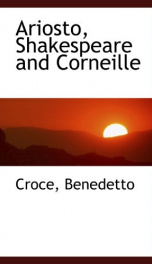Croce Benedetto
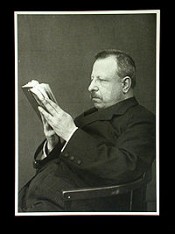
Benedetto Croce (Italian pronunciation: [beneˈdetto ˈkroːtʃe]; February 25, 1866 – November 20, 1952) was an Italian critic, idealist philosopher, and occasionally also a politician. He wrote on numerous topics, including philosophy, history, methodolgy of history writing and aesthetics, and was a prominent liberal, although he opposed laissez-faire free trade. His influence on Antonio Gramsci is quite notable. Croce was born in Pescasseroli in the Abruzzo region of Italy. He came from an influential and wealthy family, and was raised in a very strict Catholic environment. Around the age of 16, he turned away from Catholicism and developed a personal view of spiritual life, in which religion cannot be anything but an historical insitution where the creative strength of mankind can be expressed. He kept this position for the rest of his life. In 1883, an earthquake hit the village of Casamicciola, Ischia, where he was on holiday with his family, destroying the home they lived in. His mother, father, and only sister were all killed, while he was buried for a very long time and barely survived. After the incident he inherited his family's fortune and much like Schopenhauer before him was able to live the rest of his life in relative leisure, enabling him to devote a great deal of time to philosophy as an independent intellectual writing from his palazzo in Naples. (Ryn, 2000:xi[1]). As his fame increased, many pushed him, against his wishes, to go into politics. He was made Minister of Public Education for a year, and later, in 1910, moved to the Italian Senate, a lifelong position. (Ryn, 2000:xi[1]). He was an open critic of Italy's participation in World War I, feeling that it was a suicidal trade war. Though this made him initially unpopular, his reputation was restored after the war and he became a well-loved public figure. He was also instrumental in the Biblioteca Nazionale Vittorio Emanuele III's move to the Palazzo Reale in 1923. When the government that made him Minister of Public Education was ousted from power by Mussolini, he was replaced by Giovanni Gentile as the new Minister, with whom Croce had earlier cooperated in philosophical polemic against positivism. Though Benedetto Croce initially supported Benito Mussolini's Fascist government (1922-24)[2], eventually he openly opposed the Fascist Party[3], while he also distanced himself from his former philosophical partner, Gentile. Croce was seriously threatened by Mussolini's regime, and his home and library was raided by the fascist troopers. He managed to stay outside prison thanks to his status, but he was under surveillance and his academic work was kept in obscurity by the government, to the extent that no mainstream newspaper or academic publication ever referred to him. In 1944, when democracy was restored, Croce was again made minister of the new government. (Ryn, 2000:xi-xii[1]). He later left the government and remained president of the Liberal Party until 1947. (Ryn, 2000:xii[1]). His most interesting philosophical ideas are divided into three works: Aesthetic (1902), Logic (1908), and Philosophy of the practical (1908), but his complete work is spread over 80 books and 40 years worth of publications in his own bimonthly literary magazine, La Critica. (Ryn, 2000:xi[1]) Heavily influenced by Hegel and other German Idealists, such as Fichte, Croce produced what was called, by him, the Philosophy of Spirit. His preferred designations were "Absolute Idealism" or "Absolute Historicism". Croce's work can be seen as a second attempt (contra Kant) to resolve the problems and conflicts between empiricism and rationalism (or transcendentalism and sensationalism, respectively). He calls his way immanentism, and concentrates on the lived human experience, as it happens in specific places and times. Since the root of reality is this immanent existence in concrete experience, Croce places aesthetics at the foundation of his philosophy. Croce's methodological approach to philosophy is expressed in his divisions of the spirit, or mind. He divides mental activity first into the theoretical, and then the practical. The theoretical division splits between aesthetic and logic. This theoretical aesthetic includes most importantly: intuitions and history. The logical includes concepts and relations. Practical spirit is concerned with economics and ethics. Economics is here to be understood as an exhaustive term for all utilitarian matters. Each of these divisions have an underlying structure that colors, or dictates, the sort of thinking that goes on within them. The aesthetic is driven by beauty, logic is subject to truth, economics is concerned with what is useful, and the moral, or ethics, is bound to the good. This schema is descriptive in that it attempts to elucidate the logic of human thought; however, it is prescriptive as well, in that these ideas form the basis for epistemological claims and confidence. Croce also held great esteem for Vico, and shared his view that history should be written by philosophers. Croce's On History sets forth the view of history as "philosophy in motion", that there is no greater "cosmic design" or ultimate plan in history, and that the "science of history" was a farce. Croce's work Breviario di estetica (The Essence of Aesthetic) appears in the form of four lessons (quattro lezioni), as he was asked to write and deliver them at the inauguration of Rice University in 1912. He declined the invitation to attend the event; however, he wrote the lessons and submitted them for translation, so that they could be read in his absence. In this brief, but dense, work, Croce sets forth his theory of art. He claimed that art is more important than science or metaphysics, since only the former edifies us. He felt that all we know can be reduced to logical and imaginative knowledge. Art springs from the latter, making it at its heart, pure imagery. All thought is based in part on this, and it precedes all other thought. The task of an artist is then to put forth the perfect image that they can produce for their viewer, since this is what beauty fundamentally is - the formation of inward, mental images in their ideal state. Our intuition is the basis of forming these concepts within us. This theory was later heavily debated by such contemporary Italian thinkers as Umberto Eco, who locates the aesthetic within a semiotic construction.[4] Croce's liberalism is unique when compared to the standard Angloamerican definitions of liberal politics: while Croce theorises that the individual is the centre of society, he rejects social atomism, and while Croce accepts limited government, he refuses that the government should have fixed legitimate powers. Croce disagrees with John Locke in the nature of liberty, in the sense that he believes that liberty is not a natural right but an earned right that arises out of continuing historical struggle for its maintenance. Croce defined civilization as the "continual vigilance" against barbarism, and liberty fit into his ideal for civilization as it allows one to experience the full potential of life. Croce also rejects egalitarianism as absurd. In short, his variety of liberalism is aristocratic, as he views society being led by the few who can create the goodness of truth, civilization, and beauty, with the great mass of citizens simply benefiting from them but unable to fully comprehend their creations. (Ryn, 2000:xii[1]).
do you like this author?
What readers are saying
What do you think? Write your own comment on this book!
write a commentWhat readers are saying
What do you think? Write your own comment on this author!
write a commentBook list
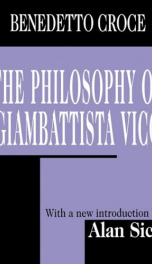
the philosophy of giambattista vico
Series:
Unknown
Year:
Unknown
Raiting:
3/5
Giambattista Vico (1668-1744) is often regarded as the beleaguered, neglected genius of pre-Enlightenment Naples. His work - though known to Herder, Coleridge, Matthew Arnold, and Michelet - widely and deeply appreciated only during the twentieth century. Although Vico may be best known for the use James Joyce made of his theories in Finnegans Wake, Croce's insightful analysis of Vico's ideas played a large role in alerting readers to his unique voice. Croce's volume preceded Joyce's creation of "Mr. John Baptister Vickar" by a quarter century. During the last 25 years Vico's ideas about history, language, anti-Cartesian epistemology, and rhetoric have begun to receive the recognition their admirers have long claimed they deserve. Increasing numbers of publications appear annually which bear the stamp of Vico's thinking. Even if he is not yet so renowned as some of his contemporaries, such as Locke. Voltaire, or Montesquieu, there are good reasons to believe that in the future he will be equally honored as a cultural theorist. As a theorist of historical process and its language, there is no more innovative voice than his until the twentieth century - which explains in part why such figures as Joyce and R.G. Collingwood freely drew on Vico's work, particularly his New Science, while creating their own. If Vico was Naples' most brilliant, if uncelebrated, citizen prior to the Enlightenment taking hold in Southern Italy, then Croce (1866-1952) is surely the city's most important thinker of modern times, and the single indispensable Italian philosopher since Vico's death. When a genius of Croce's interpretative prowess, evaluates the work of another, it is inevitable that an explosive mixture will result. A great virtue of this book is its fusion of Croce's unique brand of idealism and aesthetic philosophy with Vico's epistemological, ethical, and historical theories. If Vico's theory of cyclical changes in history remains fruitful, it might be argued that Croce's evaluation of his countryman' ideas represented the next turn of the philosophical wheel toward enlightenment.
Show more
add to favoritesadd In favorites
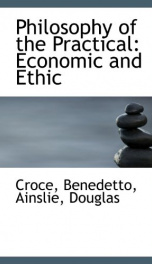
philosophy of the practical economic and ethic
Series:
Unknown
Year:
Unknown
Raiting:
4.5/5
Show more
add to favoritesadd In favorites
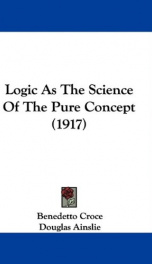
logic as the science of the pure concept
Series:
Unknown
Year:
Unknown
Raiting:
5/5
Purchase of this book includes free trial access to www.million-books.com where you can read more than a million books for free. This is an OCR edition with typos. Excerpt from book: or imperfect concepts preparatory to perfect concepts. When, for example, the position has been attained that morality is not a phenomenon of egoism and that it has value in itself, or one has become certain that Hannibal was ignorant of the disaster that befell his brother Hasdrubal on the Metaurus, it is impossible to continue believing that morality is egoism, or that Hannibal has been informed of the arrival of Hasdrubal and had voluntarily allowed him to be surprised by the two Consuls. But with conceptual fictions similar to those in the example the case is otherwise. Even when we are persuaded that the triangle and free motion correspond to nothing real, and that the rose, the cat, and the house have nothing precise and universal in them, we must yet continue to make use of the fictions of triangles, of free motion ; of houses, cats, and roses. We can criticise them, and we cannot renounce them ; therefore, it is not true that they are, at least altogether and in every sense, errors. This indispensability of conceptual fictions to the life of the spirit, finds acknowledgment in a more temperate form of the doctrine which considers them as erroneous concepts; that is, in the thesis that they are erroneous, but at the same time preparatory to, and almost a first step towards, the formation of true and proper concepts.The spirit does not issue all at once from representations and attain to the universal ; it issues from them little by little, and prior to the rigorous universal, it constructs others less rigorous, which have the advantage of replacing the infinite representations with their infinite shades, through which reality presents itself in aesthetic contemplation. Conceptual fictions, then, would be sketches of concepts, and therefore, like all sketches, capable... --This text refers to an alternate Paperback edition.
Show more
add to favoritesadd In favorites
Book list

the philosophy of giambattista vico
Series:
Unknown
Year:
Unknown
Raiting:
3/5
Giambattista Vico (1668-1744) is often regarded as the beleaguered, neglected genius of pre-Enlightenment Naples. His work - though known to Herder, Coleridge, Matthew Arnold, and Michelet - widely and deeply appreciated only during the twentieth century. Although Vico may be best known for the use James Joyce made of his theories in Finnegans Wake, Croce's insightful analysis of Vico's ideas played a large role in alerting readers to his unique voice. Croce's volume preceded Joyce's creation of "Mr. John Baptister Vickar" by a quarter century. During the last 25 years Vico's ideas about history, language, anti-Cartesian epistemology, and rhetoric have begun to receive the recognition their admirers have long claimed they deserve. Increasing numbers of publications appear annually which bear the stamp of Vico's thinking. Even if he is not yet so renowned as some of his contemporaries, such as Locke. Voltaire, or Montesquieu, there are good reasons to believe that in the future he will be equally honored as a cultural theorist. As a theorist of historical process and its language, there is no more innovative voice than his until the twentieth century - which explains in part why such figures as Joyce and R.G. Collingwood freely drew on Vico's work, particularly his New Science, while creating their own. If Vico was Naples' most brilliant, if uncelebrated, citizen prior to the Enlightenment taking hold in Southern Italy, then Croce (1866-1952) is surely the city's most important thinker of modern times, and the single indispensable Italian philosopher since Vico's death. When a genius of Croce's interpretative prowess, evaluates the work of another, it is inevitable that an explosive mixture will result. A great virtue of this book is its fusion of Croce's unique brand of idealism and aesthetic philosophy with Vico's epistemological, ethical, and historical theories. If Vico's theory of cyclical changes in history remains fruitful, it might be argued that Croce's evaluation of his countryman' ideas represented the next turn of the philosophical wheel toward enlightenment.
Show more
add to favoritesadd In favorites

philosophy of the practical economic and ethic
Series:
Unknown
Year:
Unknown
Raiting:
4.5/5
Show more
add to favoritesadd In favorites

logic as the science of the pure concept
Series:
Unknown
Year:
Unknown
Raiting:
5/5
Purchase of this book includes free trial access to www.million-books.com where you can read more than a million books for free. This is an OCR edition with typos. Excerpt from book: or imperfect concepts preparatory to perfect concepts. When, for example, the position has been attained that morality is not a phenomenon of egoism and that it has value in itself, or one has become certain that Hannibal was ignorant of the disaster that befell his brother Hasdrubal on the Metaurus, it is impossible to continue believing that morality is egoism, or that Hannibal has been informed of the arrival of Hasdrubal and had voluntarily allowed him to be surprised by the two Consuls. But with conceptual fictions similar to those in the example the case is otherwise. Even when we are persuaded that the triangle and free motion correspond to nothing real, and that the rose, the cat, and the house have nothing precise and universal in them, we must yet continue to make use of the fictions of triangles, of free motion ; of houses, cats, and roses. We can criticise them, and we cannot renounce them ; therefore, it is not true that they are, at least altogether and in every sense, errors. This indispensability of conceptual fictions to the life of the spirit, finds acknowledgment in a more temperate form of the doctrine which considers them as erroneous concepts; that is, in the thesis that they are erroneous, but at the same time preparatory to, and almost a first step towards, the formation of true and proper concepts.The spirit does not issue all at once from representations and attain to the universal ; it issues from them little by little, and prior to the rigorous universal, it constructs others less rigorous, which have the advantage of replacing the infinite representations with their infinite shades, through which reality presents itself in aesthetic contemplation. Conceptual fictions, then, would be sketches of concepts, and therefore, like all sketches, capable... --This text refers to an alternate Paperback edition.
Show more
add to favoritesadd In favorites

Aesthetic as Science of Expression and General Linguistic
Series:
Unknown
Year:
Unknown
Raiting:
3.5/5
Show more
add to favoritesadd In favorites
What readers are saying
What do you think? Write your own comment on this author!
write a commentif you like Croce Benedetto try:
readers also enjoyed
What readers are saying
What do you think? Write your own comment on this author!
write a commentGenre
if you like Croce Benedetto try:
readers also enjoyed
Do you want to exchange books? It’s EASY!
Get registered and find other users who want to give their favourite books to good hands!
